2 weeks ago, I had the wonderful opportunity to take a mini road trip to Canton and Steubenville, Ohio. What is there you may ask? Well, some pretty strong connections to Mother Angelica, a lay mystic, and a Catholic college that made me realize how God has worked out the decisions I made a few years ago for His good.
A few weeks ago, a family friend from our parishes asked if I would be interested in driving with her to pick up her daughter and friends who were currently in school at Franciscan University of Steubenville (FUS). She said along the way we could stop at the Mother Angelica Museum and the Rhoda Wise House. How could I say no?
After a quick breakfast at Cracker Barrel, (because where else can you get such a delicious meal on the road) we arrived at our first stop to learn about the roots of the powerhouse of Catholic TV and radio - Mother Angelica. The Mother Angelica Museum located in Canton, Ohio, is a retreat and spiritual center dedicated to the memory of Mother Angelica, the founder of EWTN. It holds a special significance within the local community and the broader Catholic community, as it celebrates her life and legacy stemming from such humble roots.
Known for her charismatic leadership and devotion to spreading the message of the Catholic faith, Mother Angelica is revered by many as a trailblazer in Catholic media. The retreat center is a way to honor her work, providing a space for individuals to learn more about her life, spirituality, and the mission she left behind through EWTN. Visitors can walk through a series of shadow boxes displaying artifacts and relics of her life in Canton as well as the Mary, Ark of the Covenant chapel which houses a few dozen relics of some pretty hardcore saints.
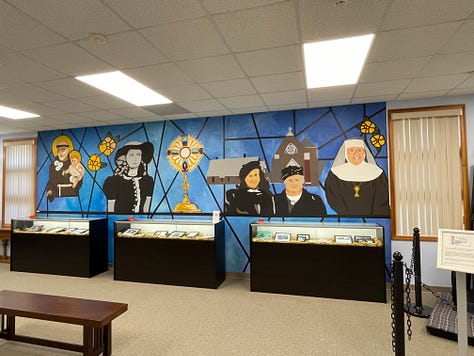

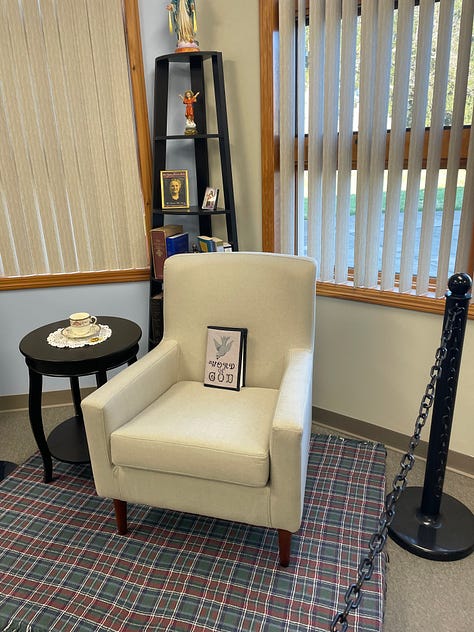
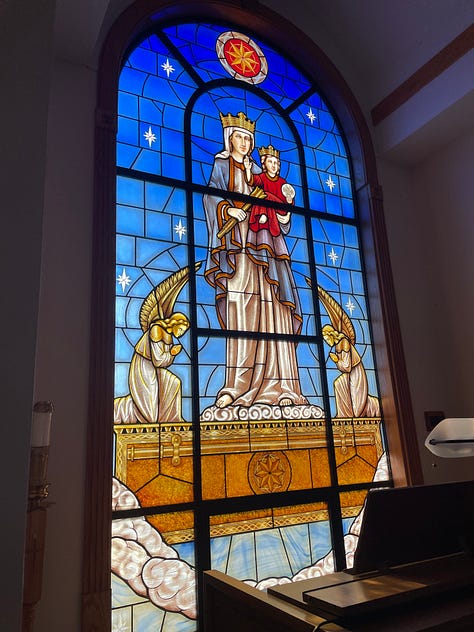

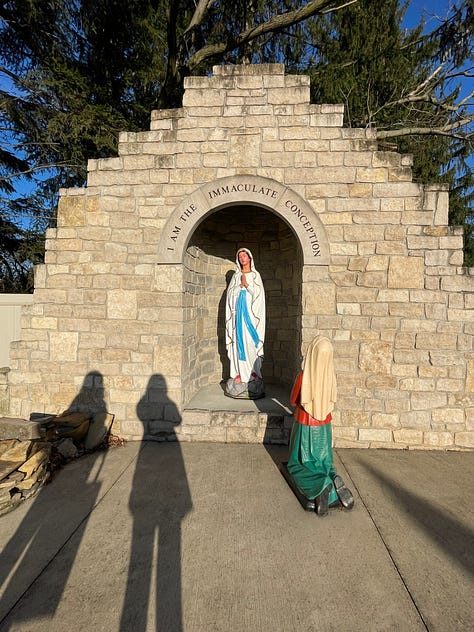
Next, we traveled a short 10 minutes to the Rhoda Wise House where we were greeted at the door by the woman who had taken care of Rhoda’s daughter for years and is now in charge of managing the house and outside prayer grotto. We sat down to listen to the beautiful testimony via video of Rhoda’s life and her visions of Christ.
Rhoda Wise was a Catholic mystic and healer, known for her deep faith, spiritual experiences, and role in promoting the Catholic devotion to the Sacred Heart of Jesus. Born in 1888, Rhoda experienced a series of personal trials, including a severe illness that led her to develop extraordinary spiritual gifts, including the ability to heal others through prayer. Her story became widely known after she reportedly received mystical visions and messages from Jesus, the Blessed Mother, and saints such as St. Therese of Lisieux. Her home became a pilgrimage site for those seeking spiritual healing, and she was was known for her profound simplicity and faith.
Rhoda's healing ministry was based on prayer, love, and devotion to the Sacred Heart, and she often encouraged others to trust in God's will for their lives. One such example was Rita Rizzo, a young girl who was healed of her stomach ailment through the intercession of St. Therese of Lisieux (by a novena given to her by Rhoda Wise), and who would grow up to become known as Mother Angelica.
The house and grotto in Canton has become a historical site and center of devotion, where visitors can learn about her life, faith, and healing ministry. The house, now a museum and pilgrimage site, holds special significance for those devoted to Rhoda's memory and the spiritual teachings she shared. Rhoda's life and the stories of the miracles associated with her home continue to inspire many Catholics who visit the site to pray and seek spiritual healing.
We were able to sit in Rhoda’s rocking chair, pray in her bedroom where she experienced her mystical visions, and sit in the very chair that Jesus had sat in when He visited her. We saw the dress and head bandages stained with blood from when she regularly received the stigmata and prayed with the relics of saints such as St. Therese of Lisieux and JPII that adorned the home altar her husband had built for her.



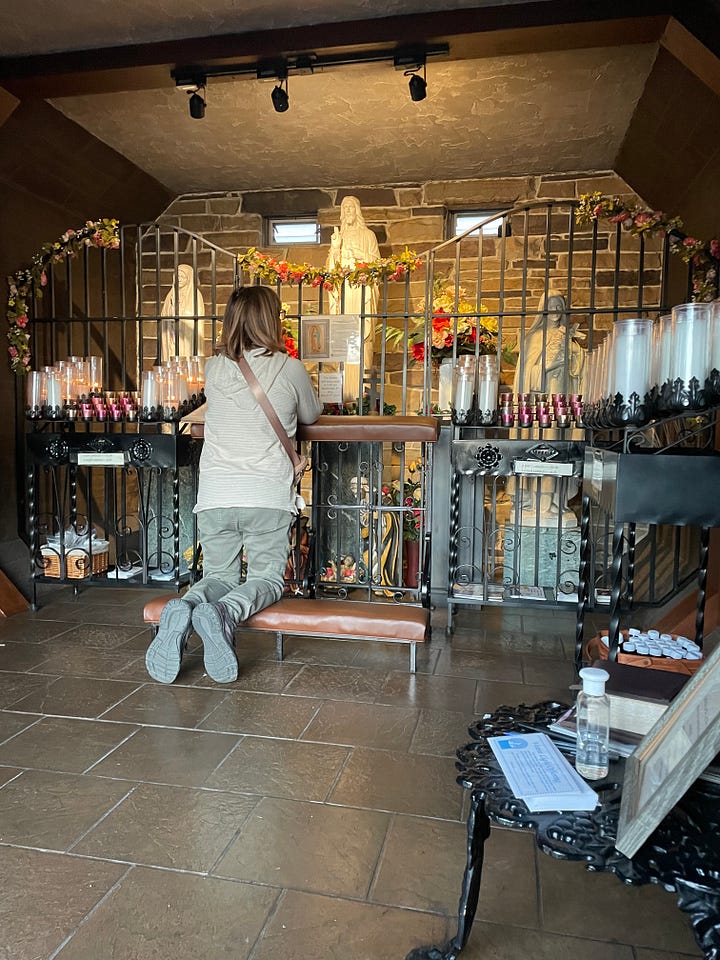
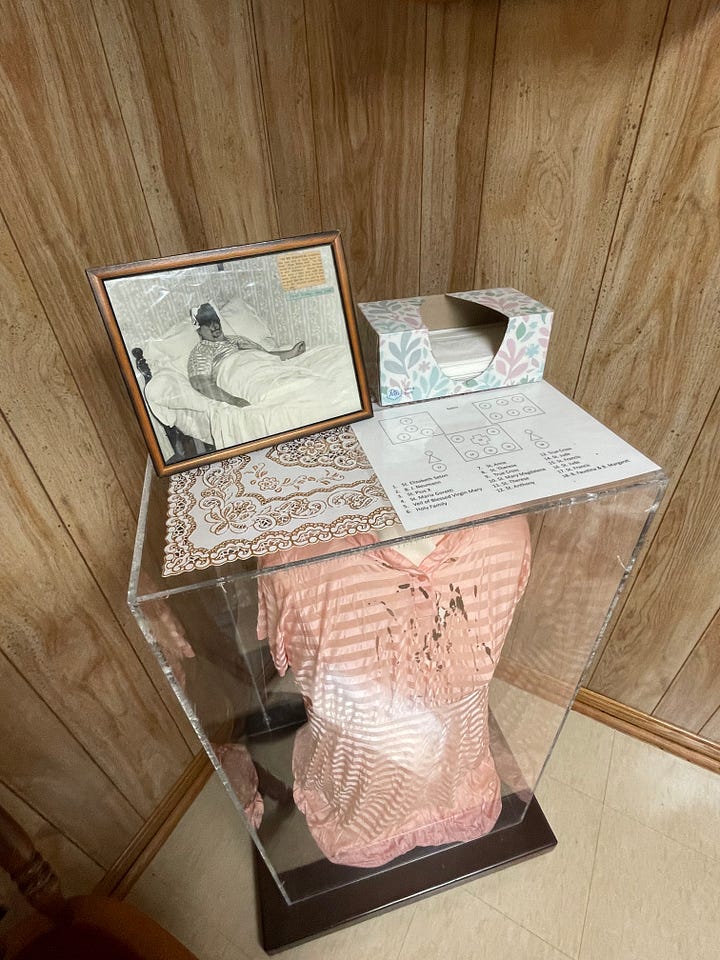
Our trip then took us to the FUS campus. I hadn’t been on the campus since high school when I attended a Steubenville conference, but it seemed so much bigger and more hilly than I remembered. As we waited for the girls to finish up their night classes and pack their stuff into the back of the car, I started to feel a large divide between myself and them. Even though these girls were only about a year younger than I am, it felt like we were living in completely different worlds. As they were talking about the struggles of dorming on campus, terrible dining hall food, and professors with strict deadlines, their mom and I had been talking about the costs associated with owning a home, the stress of maintaining full time work and balancing family life, and the impact of our health on our futures.
I want to clarify, I don’t bring up this divide to make these girls seem immature. In fact, quite the opposite- they are age appropriate. I made the decision years ago to push myself harder and faster into the future, purposefully placing a divide between peers my own age. Sitting in the car, listening to these girls laugh and reminisce about their adventures on campus, I realized how much I missed out on when I decided to skip the college experience after COVID hit and focus on just ‘jumping through the hoop’ of an online degree and working full time so I could move on with my life. I really only had a single semester of the typical ‘college life’ before the world shifted and I adapted, making the decision to forego all college life entails for a more practical approach. I skipped the future Friendsgivings, student clubs, nights out, and more so I could save money, gain work experience, and finish getting that coveted piece of paper that may or may not prove I know something.
Looking back, I think I went into survival mode. After my first college essentially shut down my program, I was left in a big ol’ puddle of gray, floundering to find a place that would accept my credits and allow me to continue studying theology at a price I could afford on my own. At the time, I put into God’s hands my academic future, asking Him that if I wasn’t meant to be in that place with those people, then I would be willing to leave it behind to go wherever He needed me. Thankfully, Holy Apostles College & Seminary fit the bill (both fiscally and program-wise, so yes, a subtle plug for my current workplace and school). I made the decision to go out on my own to a college not many had heard of, to partake in a fully online degree, in order to work full time to support myself. I was putting distance between myself and the stereotypical college life my friends were living. It eventually turned out to be one of the best decisions I ever made, though incredibly difficult at the time.
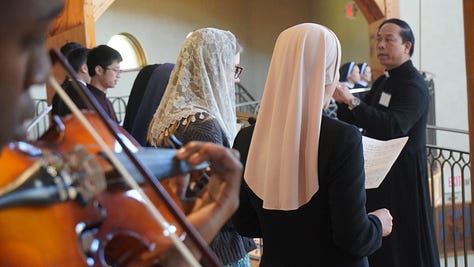

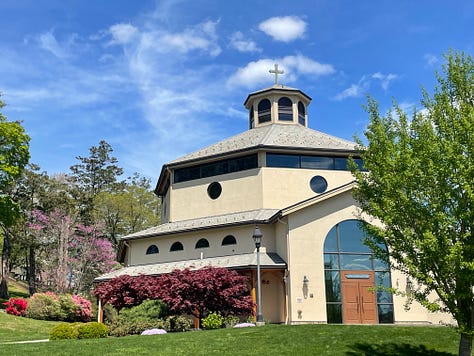

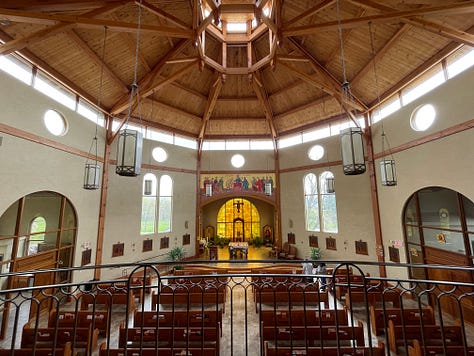

While I will admit that making the decision to skip the rest of the typical college experience was one of the reasons that my life worked out in the way that it did, with all of the wonderful work and life experiences gained, I couldn’t help but feel like I missed out a bit that night we drove home from Ohio. These girls were living out age appropriate experiences and I felt a million miles away. I couldn’t really empathize with their part-time jobs during semester breaks, the stress of picking out roommates, or trying to fit in ice skating when trying to write papers. I remembered my only semester living on campus at college and trying to balance, friends, family, and school; but, it was nothing compared to the stress of living a fully independent adult life. A life these girls have not yet branched out into.
I've often felt like an outsider because of the path I've chosen to take, especially when it comes to not experiencing the ‘normal’ things that people my age seem to go through. While others are focused on parties, dating, or just figuring out life at a more leisurely pace, I’ve been moving ahead with responsibilities and goals that don’t always align with what they care about. It’s not that I don’t want to connect with them—it’s just that the things they talk about don’t always resonate with me, and vice versa. Sometimes, it feels like I’m living in a different world altogether, where the things I’ve prioritized don’t seem to matter in their circles, and I end up feeling a little isolated. I often find myself stuck in conversations that feel shallow, or that I can’t contribute to because I’m just in a different place, mentally and emotionally.
The loneliness that comes with this is hard to ignore, especially when I realize that so many of my peers are sharing experiences I never had the chance to explore. It's difficult to relate to their stories, and harder still to explain why I chose to skip those typical experiences. I’ve missed out on the carefree moments others get to enjoy, and it can make me feel like I’m out of sync with everyone else. Even though I know I’ve made choices that align with my goals and values, it’s frustrating not to have others close to me who truly understand where I’m coming from. I sometimes question if I’m missing out on something, or if I’m too focused on moving ahead at the expense of connecting with people who are simply in a different stage of life. It’s a strange tension between wanting to be understood and realizing that I might just be too far down a different road to ever really connect on the same level.
Solitude is often seen as a problem to be solved, an emptiness to be filled, or a fate to be avoided. Indeed, sometimes it is all of these things. But solitude can also be a garden, weeded, cultivated, and tilled, from which the Lord brings forth a rich spiritual harvest. If we’re feeling lonely, maybe that’s a sign that we need to be with someone — or maybe it’s an opportunity to remind ourselves that Jesus is with us.
A.W. Tozer, the American preacher and author, gave an interesting sermon on how solitude makes saints. He argues that this loneliness may be necessary for saintliness, as God speaks more deeply and intimately to those who are alone with Him. Tozer emphasizes the significance of solitude for spiritual growth, highlighting biblical examples of figures like Abraham, Moses, Elijah, and Jesus Christ who experienced aloneness in their ministries. He notes that solitude can bring healing and restoration, but also lead to loneliness and isolation.
“Loneliness would seem to be the price that the saint must pay for His saintliness.”1
He begins by addressing the common misconception that faith is primarily about group activities or communal experiences. While fellowship and support from other believers are vital, Tozer argues that each believer must walk alone to a certain degree in their relationship with God. Group prayer can certainly be efficacious, but individual time spent with our Lord is when He truly speaks to our hearts. (Ps 27:8) “I believe that God wants to speak to us, and that He speaks more deeply and intimately and wonderfully when he can get our ear all by ourselves.”2 Tozer stresses that spiritual maturity is an individual experience that cannot be fully shared or gained on behalf of someone else.
Tozer further explores the idea that true spiritual growth often involves moments of isolation and separation from worldly distractions. He reflects mainly on Christ, who spent time alone consistently in the New Testament in order to communicate more effectively with His Father. For Christ, Tozer outlined how alone He truly was during His life:
“Now that was Jesus, not only in the garden, but very many other places. Forty days alone in the desert and on the mountain alone many times and on the shore alone after His resurrection, Jesus Christ died alone and rose alone. I repeat, there are some things too sacred for the eye of any but God to see. And when our Lord died, God pulled the curtain of the night down around the cross in order that He might die alone.
And when He rose again, He rose unseen by the eye of mortal man. I don’t know whether angels saw Him rise, but I know men did not, as though God were saying, His birth and His death and His rising again are secret, and only My eye can look upon these awesome and awful and glorious scenes.”3
These times of solitude, Tozer believes, are essential for the deepening of one's faith. It is in these quiet, solitary moments that believers are most able to hear God’s voice and develop a deeper understanding of His will. (Ps 46:11) The act of walking alone, according to Tozer, is a way of forsaking the comforts and dependencies of human relationships in order to grow closer to God.
Lastly, Tozer underscores that walking alone does not mean living in isolation or abandoning the community of faith. Instead, it is about prioritizing the relationship with God above all else. While due to the constitution of human nature’s sinfulness, the pain of loneliness exists and we accept that believers must remain connected to the body of Christ. However, their ultimate dependence should be on God alone. Tozer challenges Christians to embrace the solitude necessary for spiritual growth, warning that those who rely too heavily on external sources of affirmation and support risk missing the intimate, transformative relationship God desires with each of His followers. In fact, he is quite blunt in regards to this point:
“For I know that this very loneliness throws us back upon God. God has to do this to bring us back on Himself. We would never, never seek Him if it were not that we see through the emptiness of man’s social fellowships. And to a large degree we see through the emptiness of man’s religious fellowships, and we don’t want to die like that. I don’t want to have to die in a crowd. Or if I do die in a crowd, I don’t want to have to have the crowd in order to die in comfort… But God help the man that has to have help when he is dying. God help the man that has to be surrounded and cheered up and his hand held, and his brow patted in order to keep him from terror in the hour of his demise. God pity that man.
For just as you were born alone, you will die alone. And though you were surrounded by friends and helpers and doctors and nurses, and your mother was there and all the rest, you were born alone. And when you die, you will die alone. So, we’d better get used to a loneliness that isn’t a loneliness.”4
The message is clear: while the journey of faith is shared with others, each believer must walk alone in their personal relationship with God. I encourage you all to read his full talk or listen to the recording from 1956, it is quite moving: The Saints Must Walk Alone.
I don’t say all of this expressing regret at the decisions I have made to thrust myself into a time line I originally wouldn’t have planned. I’m content and made (enough) peace with them. I guess I am just realizing now that it has placed me in a position of loneliness that has created space for me to grow in communion with the Lord. A space of solitude and disconnectedness that the saints of both Old and New Testament had experienced and used to grow in their relationship with God. I can take this distance I feel both spiritually and socially from my peers and feel connected to those saints who also felt removed from their own community while trying to follow God’s will. It doesn’t make it any less lonely, but at least I can begin to learn to be alone with Christ. “For the saint must walk alone.”5
Talk to you soon,
Ryleigh
https://tozertalks.com/tozer-talks-157/
Ibid.
Ibid.
Ibid.
Ibid.




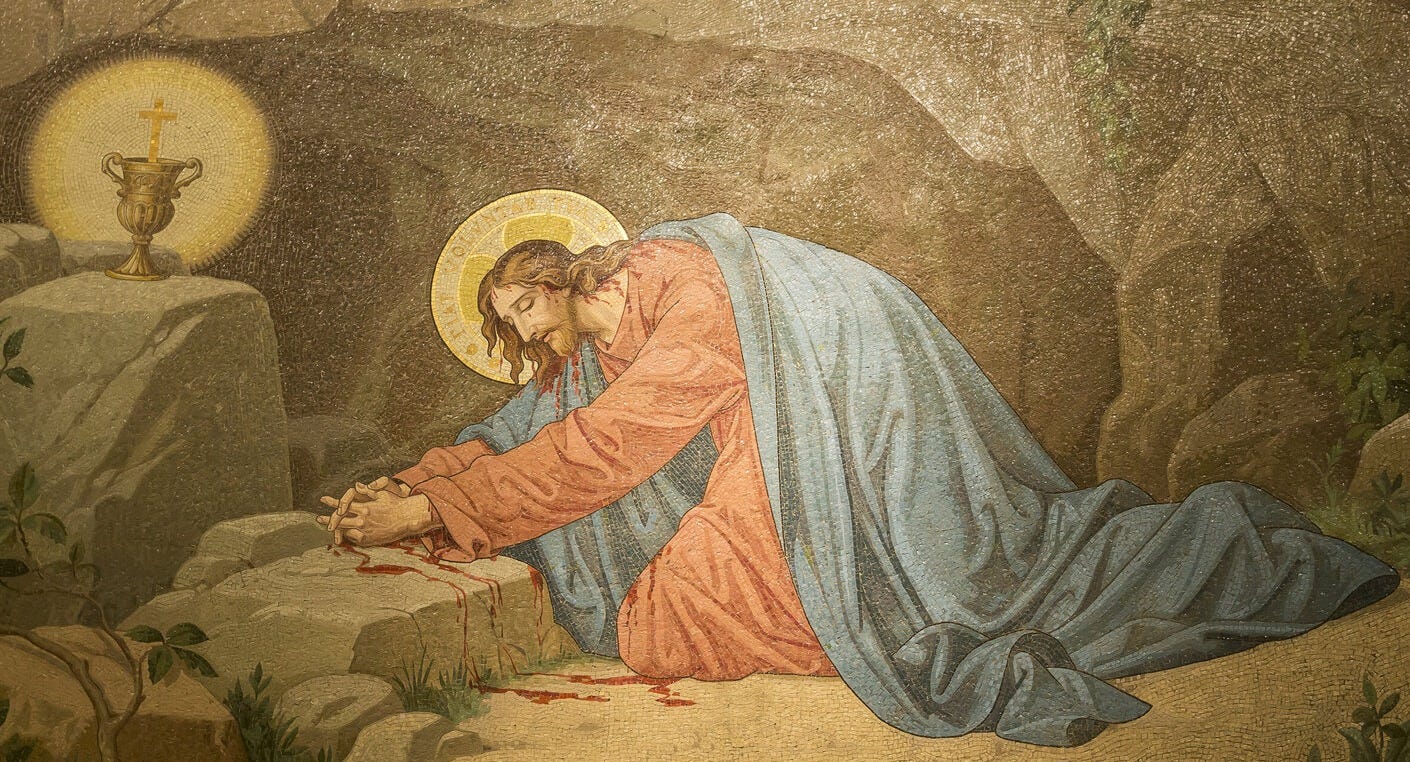
God has a way of tearing up our plans until we say "Thy Will Be Done". It's only a loss until we realize the journey God has set us on is the best possible outcome for us. I say this as much to myself as to you. There's more relatable about your story than the merely circumstantial and/or collegiate.
Your description of our wonderful online college is spot-on--both the pros and the cons. There's definitely a loneliness that accompanies online studies, even despite making good friends with one's peers (like you!). Visiting the campus always makes me nostalgic for the regular college experience that I never had as a fully online student. I'm sorry that you share the loneliness too, but there is a consolation (at least for me) to learn that I'm not the only one who feels that way about online school. I'm praying for you! :)